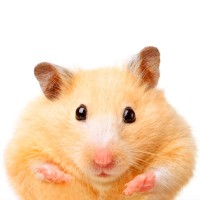Are you looking for a small pet that is very cute but also quite charming and easy to care for? A hamster may be perfect for you! Here, an Ellicott City, MD vet offers some helpful tips on keeping your pint-sized pal happy and healthy.
Give Hammie A Comfy Cage
Making sure Hammie has a comfy cage is very important. The exact size cage your pet will need will depend on what kind of hamster you have, so ask your vet for recommendations. You’ll also need to add dishes, a water bottle, a hidey-hole, and lots of toys, including plenty of chew toys. Hammie will also appreciate having some tunnels and mazes to explore.
Don’t Overfeed Hammie
Hamsters are small, but they are, well, quite the little hams. Hammie has a habit of stashing food and hiding it for later, and then begging for more. If you fall for your furry buddy’s theatrics, you may soon find yourself with a pudgy pet on your hands!
Monitor the Temperature
Hammie can get very sick if he gets too cold! Keep your hamster in a room that always stays between 65-75 degrees. If your pet gets too chilly, he may instinctively try to hibernate. Since pet hamsters don’t really know how to hibernate properly, this can be very dangerous for the little guy!
Offer Suitable Bedding
You’ll need to put about 6 inches of bedding in Hammie’s cage, to make sure he can dig tunnels. Choosing the right type of bedding is also important. Avoid pine, cedar, and cotton bedding, as they are not safe for small animals. Aspen is fine. Remove waste and uneaten food daily. Ask your vet for more information.
Feed Suitable Food
Proper nutrition is just as important for hamsters as it is for larger pets. You can give the little guy commercial food for his main meals. Scatter the food around his cage to make mealtimes more fun for him. For treats, your pint-sized pal can have many types of produce, such as celery, apples, peppers, lettuce, and carrots. Always research new foods before giving them to your adorable furry friend. Many types of food, such as onions, citrus fruits, pitted fruits, and avocados, are toxic to hamsters. Ask your vet for nutritional advice.
Please contact us, your Ellicott City, MD vet clinic, to learn more about hamster care. We are here to help!





